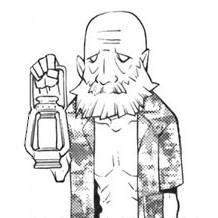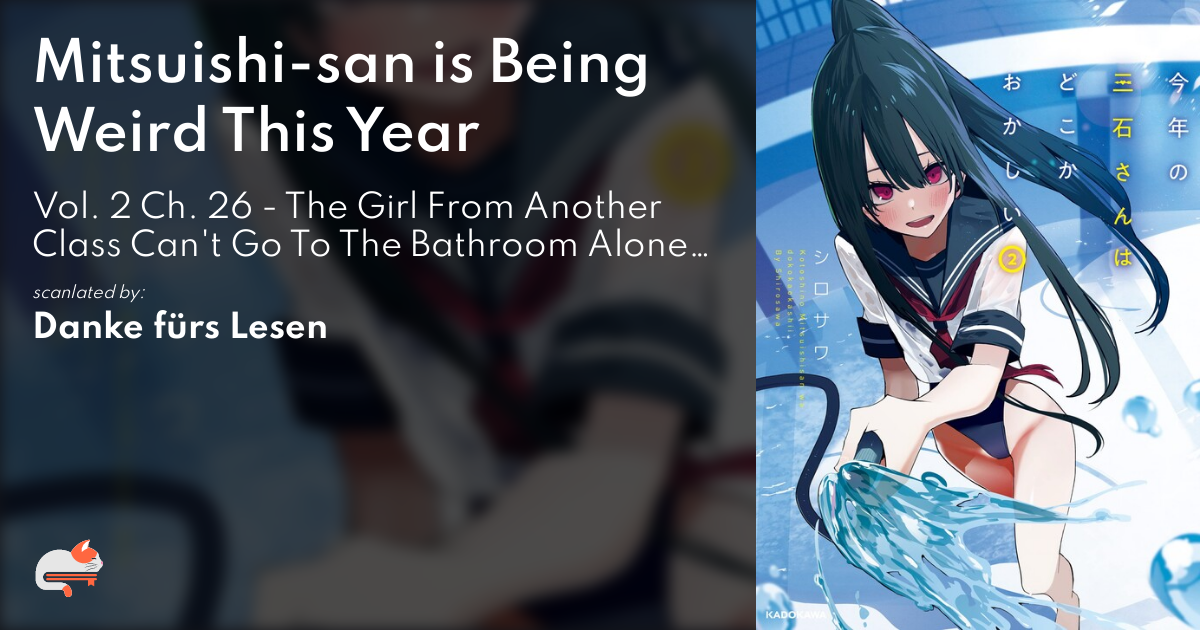Rottcodd
- 26 Posts
- 15 Comments

 2·1 year ago
2·1 year agoIf you’re new to the series and/or lost (not unexpected for Dowman Sayman), the scanlators, Profiterol, also just released updated versions of the first three chapters, based on the tank chapters instead of the original magazine chapters, so this is a great opportunity to start at the beginning.
And maybe still end up lost…
And there it is.
Just to note - the mangaka has already said that he has plans that will keep this going at least until January, so we’re not even close to done here.
I’m looking forward to it.
Ah - I thought to explain the connection, but didn’t want to belabor the point if you already got it.
First and most broadly, Fujimura is a tsukkomi completely surrounded by bokes, much like Alvin.
More curiously though, there’s a side character who’s just called Helmet because he’s never seen without a full-face helmet, just like Alvin. And even to the point, again like Alvin, that in the rare event that he isn’t wearing his helmet, his face is pointedly hidden anyway.
On the one hand, that’s a sort of meaningless detail, but on the other hand, it’s a meaningless detail that matches up between the two. It seems too insignificant to be deliberate but too obscure to not be.
And yeah - it’s good. It’s mostly the same sort of boke and tsukkomi humor as this, and with really good characters (the fmc - Eri - is still one of my all-time favorite manga characters). And it’s also a surprisingly effective harem series, since the girls are all bokes of one sort or another, which is an alternative reason for them continually pestering Fujimura, and he can’t help but tsukkomi, which explains the otherwise awkward harem contrivance of the MC generally not figuring out what’s going on. It’s not so much that he can’t figure it out as that he can’t take it seriously - he thinks they’re just sort of deranged. And he’s not entirely wrong.
I keep wondering how much, if at all, this was inspired by Fujimura-kun Meitsu. It’s sort of as if Helmet got a spin-off manga and was promoted (or demoted, as the case might be) from boke to tsukkomi.

 2·1 year ago
2·1 year agoJust another seemingly effortless combination of philosophy, psychology, heartfelt emotion and godly art.

 1·1 year ago
1·1 year agoI wouldn’t normally post another chapter of a series with this many releases quite so soon after the last one, but this is too good to miss.
Yeah - she’s pretty much “must protecc her” turned up to 11.
After that brief thing about an opportunity to play piano a few chapters back, I’ve been looking forward to seeing more about whatever it is Tatsu’s doing (and especially to see Ri-chan’s reaction).
deleted by creator
How so?
One team translated the first 20 or so chapters, slowly and not very well. Then another one (or more precisely one person) took it over and started over with chapter 1, and has done everything since.
If you start with fettyman’s version of chapter 1, you shouldn’t even see the other ones - when you finish one chapter, Mangadex will automatically jump to fettyman’s version of the next chapter. It’s literally as if the other versions don’t even exist.
I don’t see the problem.
Ah - Ri-chan finally opened up a bit to Tatsu-nii.
That loud blonde could be trouble though.
That’s a lot of the advantage of getting all of these chapters at once. As I noted, I was already following this, but wasn’t really sold on it. And part of the problem was that it was out to 30 or so chapters, and we still hadn’t really learned much about Ri-chan.
But the thing is that this one’s moving slower and going into much more detail, so instead of suddenly slapping us with a condensed version of the history of her trauma, and with virtually no context, we’re getting things slowly fleshed out. And yeah - I think it’s better execution in the long run. It just needed enough chapters to really get moving.
Another notable difference is that this one has introduced more characters, and I think that’s going to be better in the long run too. We’ve already gotten glimpses into Ri-chan’s relationships with both of her parents, and seen clues to how she came to be who she is. And we’ve already seen that her mom is apparently not as cold and distant as she initially appeared to be, and I fully expect more revelations about them.
Glad you liked it.
I’ve been following this one for a while and was sort of undecided about it. It’s a page-a-day webcomic, self-published on Twitter. Or more precisely, it’s two pages a day, with the main story pages on Twitter and bonus pages on Fanbox. It was apparently partly inspired by Zyugoya’s When I Returned to My Hometown, My Childhood Friend Was Broken and is a similar set-up, though there’s no sexual content (even in the Fanbox pages) - this childhood friend was broken by a different chain of events. So it seemed sort of derivative, and the translations were apparently machine and sort of iffy. And slow. So I just wasn’t sold.
Then, yesterday, a scanlator called fettyman posted 119 pages - 60 regular chapters and 59 corresponding bonus chapters, starting from the beginning. And with quality translations and enough pages to get a grasp on the somewhat disjointed and sprawling story, I can say I think it’s actually pretty good. It still sort of feels like a freshman effort and the gimmick of alternating every main story page with a non-story bonus page makes it sort of awkward to read straight through, but it has heart, and some great moments. And Ri-chan is an intriguing character with an interesting history.

 2·1 year ago
2·1 year agoCaught up with one I just stumbled across - Himegasaki Sakurako wa Kyoumo Fubin Kawaii! (Sakurako Himegasaki is Still Pitiably Cute Today).
It’s basically a deconstruction of every romcom/harem trope in existence, all mashed together into one great big ball of stupidly funny craziness, and lots of fun.
And of course a bunch of updates to ongoing things, most notably the final chapter of Tugeneko’s glorious Ueno-san wa Bukiyou.

 4·1 year ago
4·1 year agoI don’t think any individual opinion on whether or not copyright should exist is or should be seen to be relevant to anything.
The simple fact of the matter is that the concept exists. We’re not going to be able to magically make it disappear, so saying that it shouldn’t exist is incoherent at best.
That said, I can certainly see why people want to see it disappear - because it’s basically become an easily abused way for rent-seeking scumbags to profit from somebody else’s work.
I think the fundamental problem isn’t that it exists, but that it’s treated as a criminal matter. Up until fairly recently, it was a purely civil matter. Anyone who was so inclined could file suit against someone they believed had infringed on their copyright, and if they could prove that they legitimately had the copyright AND that they had suffered concrete losses, they could collect damages.
However, at the behest of enormous corporations like Disney who bought enough influence to make it happen, copyright was changed into a criminal matter, so the corporations offloaded the cost of enforcement and no longer have any need to prove that they’ve suffered any actual loss - the purported copyright violation in and of itself is sufficient.
I think that the creator of a work very obviously has a greater right to it than anyone else can possibly have. And the alternative would be to proactively decree that the creator of a work could NOT claim ownership of it and could NOT seek redress for any losses incurred through someone else’s unapproved use of their creation, and that, IMO, is unconscionable.
So I support the idea in principle.
But in my perfect world, it would be a wholly civil matter, and the specifics would depend on the specific case. Broadly, I think that the copyright holder should and likely could only seek redress for specific, demonstrable losses.
And briefly, regarding the term, I don’t think it should be fixed. I think it should be judged relative to the individual case.
So if, for instance, someone was seeking damages for the unapproved use of a creation that is wholly obsolete and otherwise entirely out of the public eye, they should have a much more difficult time claiming a loss, even if the thing is only, say, five years old. And on the other hand, if the thing in question is something that the creator is still regularly and successfully marketing, they should have an easier time claiming a loss, even if it’s, say, 70 years old.

 1·1 year ago
1·1 year agoYes - very much so.
This feels like a community of actual people who can and do actually think and engage.
Reddit felt like a vast sea of idiots, trolls, shills snd bots.




















Mom’s a great character - she comes across as stern and distant and intimidating, but we get to see what’s underneath that.
And it just hit me - I don’t recall a specific reference to where her dad is now, but I’m willing to bet that he’s in Tokyo, and we’re going to get to meet him soon.